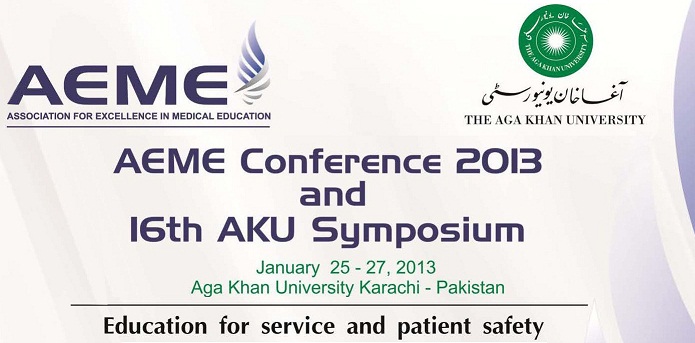Day 1 : Oral Presentations (Theme: Patient Safety)
Understanding of student pharmacist about antibiotic resistance: Qualitative groundwork
Location
Lecture Hall 2
Start Date
26-1-2013 10:40 AM
Abstract
Background: The incessant increase in antibiotic resistance is a major cause of concern in Pakistan. Doctors and pharmacists are in a better position to control this problem. The current study is aimed to evaluate the understanding of phenomenon of antibiotic resistance among student pharmacists.
Methods: Qualitative research methodology was adopted to have an in depth insight about the issue. Two Focus Group Discussions (FGDs; n=13) were conducted with final year pharmacy students of the University of Karachi, Pakistan. A semi-structured interview guide comprising of seven questions was employed as data collection tool. Cold, flu, diarrhea and upper respiratory tract infections were used as probes to evaluate their understanding and awareness about appropriate antibiotic use. Questions were asked about the underlying mechanism of antibiotic resistance and the contributory factors towards resistance. Opinion about the role of pharmacists toward minimizing antibiotic resistance was also inquired.
Results: Student pharmacists clearly highlighted those diseases in which antibiotics are unjustified. Respondents highlighted that these diseases are generally self-limiting and even if there is a need of antimicrobial, antiviral could be the right choice. The respondents reported that inappropriate prescribing and dispensing by the pharmacists and doctors, patients demands of antibiotics from the healthcare professional for speedy recovery and lucrative offers of industries to doctors and pharmacists are major contributory factors towards antibiotic resistance. There is no clear answer about the underlying mechanism of antibiotic resistance.
Conclusions: Student pharmacists extensively highlighted that their status in the healthcare system should be well-recognized and they should be invited to involve in antibiotic surveillance program at the national level. Likewise a similar sort of study is already in execution with the student pharmacist at the Malaysian pharmacy schools. Future recommendations should be directed to probe the understanding of students doctors about the antibiotic resistance
Key words: antibiotic resistance, Karachi, Malaysia
Understanding of student pharmacist about antibiotic resistance: Qualitative groundwork
Lecture Hall 2
Background: The incessant increase in antibiotic resistance is a major cause of concern in Pakistan. Doctors and pharmacists are in a better position to control this problem. The current study is aimed to evaluate the understanding of phenomenon of antibiotic resistance among student pharmacists.
Methods: Qualitative research methodology was adopted to have an in depth insight about the issue. Two Focus Group Discussions (FGDs; n=13) were conducted with final year pharmacy students of the University of Karachi, Pakistan. A semi-structured interview guide comprising of seven questions was employed as data collection tool. Cold, flu, diarrhea and upper respiratory tract infections were used as probes to evaluate their understanding and awareness about appropriate antibiotic use. Questions were asked about the underlying mechanism of antibiotic resistance and the contributory factors towards resistance. Opinion about the role of pharmacists toward minimizing antibiotic resistance was also inquired.
Results: Student pharmacists clearly highlighted those diseases in which antibiotics are unjustified. Respondents highlighted that these diseases are generally self-limiting and even if there is a need of antimicrobial, antiviral could be the right choice. The respondents reported that inappropriate prescribing and dispensing by the pharmacists and doctors, patients demands of antibiotics from the healthcare professional for speedy recovery and lucrative offers of industries to doctors and pharmacists are major contributory factors towards antibiotic resistance. There is no clear answer about the underlying mechanism of antibiotic resistance.
Conclusions: Student pharmacists extensively highlighted that their status in the healthcare system should be well-recognized and they should be invited to involve in antibiotic surveillance program at the national level. Likewise a similar sort of study is already in execution with the student pharmacist at the Malaysian pharmacy schools. Future recommendations should be directed to probe the understanding of students doctors about the antibiotic resistance
Key words: antibiotic resistance, Karachi, Malaysia

